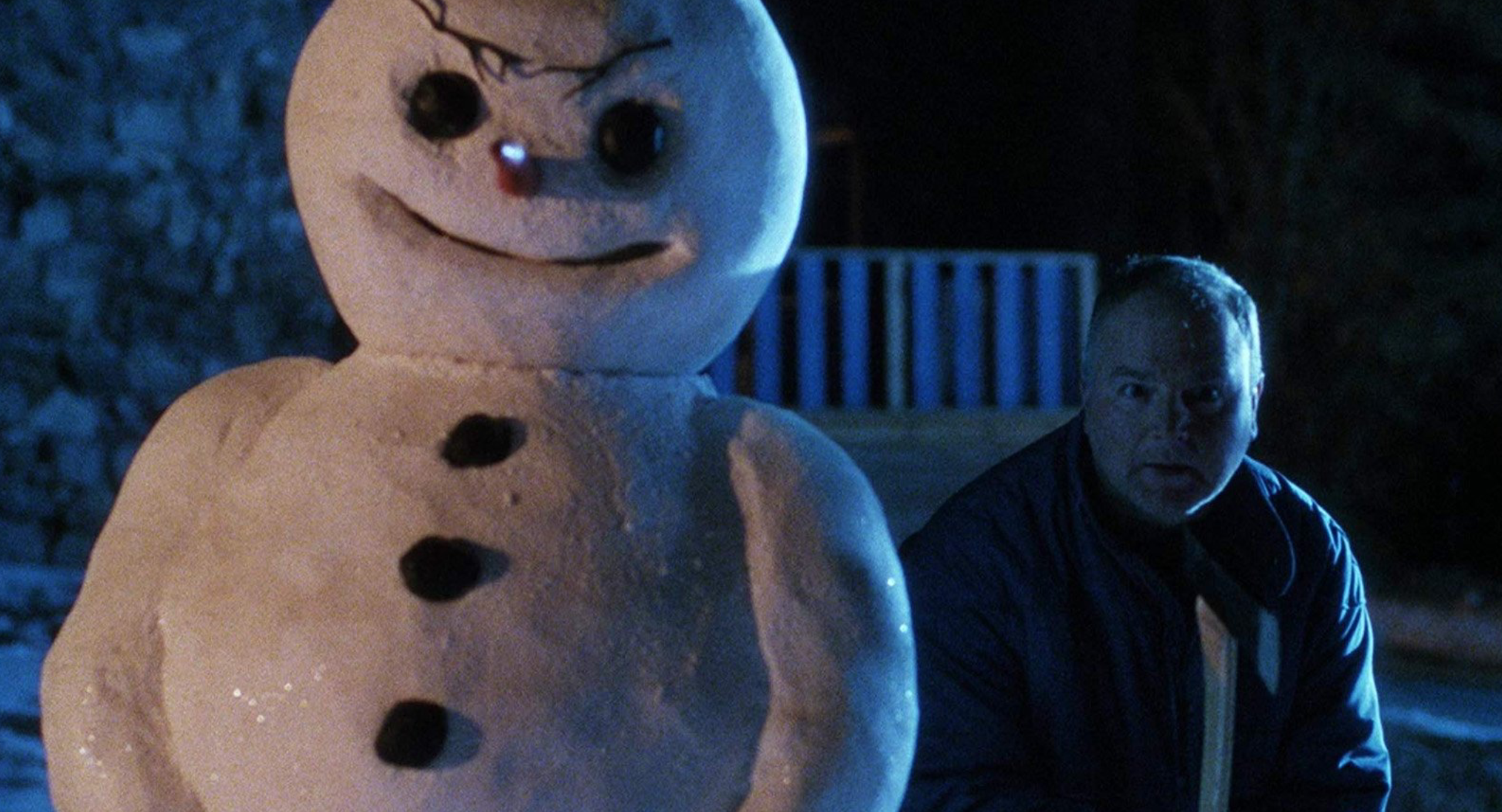Jack Frost (1997) – Film Review
Published January 16, 2025

The 1997 horror-comedy Jack Frost is a bizarre amalgamation of campy absurdity, low-budget effects, and an outlandish premise that lands somewhere between unintentional hilarity and utter disaster. Directed by Michael Cooney, the film tells the story of a murderous snowman who terrorizes the small town of Snowmonton. While it has garnered a cult following for its sheer ridiculousness, Jack Frost struggles to rise above its cheap production values, clunky narrative, and overreliance on bad puns.
The film opens with a backstory delivered by a voiceover, setting the tone for the absurdity to come. Jack Frost, a deranged serial killer, is being transported to his execution when a freak accident involving a genetic research truck causes him to merge with snow. Now a sentient, homicidal snowman, Jack embarks on a spree of icy carnage, targeting Sheriff Sam Tiler (Christopher Allport), the man responsible for his capture.
The premise is undeniably unique, but it’s handled with a degree of silliness that undermines any potential tension. Cooney’s script is packed with cheesy one-liners and sight gags, leaning heavily into the camp factor. Unfortunately, the humor often feels forced, and the film’s tone oscillates awkwardly between horror and comedy, failing to strike a satisfying balance.
One of the most glaring issues with Jack Frost is its low-budget production, which becomes apparent almost immediately. The special effects, particularly the design of the titular snowman, are laughably poor. Jack’s appearance alternates between a cartoonish foam costume and poorly executed stop-motion, making it difficult to take the character seriously as a threat.
The kills, a key element of any slasher film, are similarly underwhelming. While the film attempts to be creative—using icicles as weapons and featuring a particularly infamous scene involving a bathtub—the execution is clunky and unconvincing. The gore effects are minimal and unrefined, detracting from the impact of these moments. What should be shocking or inventive instead comes across as amateurish.
The cast does their best with the material, but their performances are hampered by the absurd script and weak direction. Christopher Allport as Sheriff Sam Tiler is the closest the film comes to having a grounding presence, but even he struggles to lend credibility to the increasingly ridiculous events. The supporting cast, including Eileen Seeley as Sam’s wife and Scott MacDonald as the voice of Jack Frost, lean into the over-the-top nature of the film, delivering performances that border on parody.
While MacDonald’s vocal performance captures Jack’s sadistic glee, it also veers into cartoonish territory, further diluting any sense of menace. The human characters, meanwhile, are largely forgettable, serving as little more than fodder for Jack’s rampage.
Jack Frost aims to be a self-aware horror-comedy, but much of its humor misses the mark. The film relies heavily on puns and one-liners, many of which feel more groan-inducing than clever. Lines like “Looks like Christmas came early!” and “Have an ice day!” are emblematic of the film’s reliance on lowbrow humor.
There are moments where the absurdity works in the film’s favor, eliciting genuine laughs from its sheer audacity. For instance, Jack’s transformation into a puddle to infiltrate a home or his use of a carrot as an improvised weapon showcase a creative, albeit ridiculous, approach to the character. However, these moments are few and far between, buried under a deluge of poorly executed jokes and sight gags.
At just 89 minutes, Jack Frost should feel like a brisk, entertaining romp, but the film’s pacing is surprisingly uneven. The first act is bogged down by exposition and set-up, taking far too long to introduce Jack in his snowman form. Once the action finally picks up, the film struggles to maintain momentum, with repetitive scenes of townsfolk meeting their demise interspersed with sluggish attempts at character development.
Despite its many flaws, Jack Frost has managed to carve out a niche as a cult classic. Fans of so-bad-it’s-good cinema may find enjoyment in the film’s unintentional hilarity and unapologetic embrace of absurdity. The over-the-top premise and laughable effects have a certain charm for viewers willing to overlook the film’s shortcomings.
The film’s holiday setting also adds to its appeal for those seeking unconventional Christmas-themed entertainment. However, this niche appeal doesn’t excuse the film’s lack of quality or coherence. While it’s possible to enjoy Jack Frost as a guilty pleasure, it’s difficult to argue that it succeeds as either a horror film or a comedy.
What’s perhaps most frustrating about Jack Frost is the missed potential. The idea of a killer snowman is undeniably unique and ripe for darkly comedic exploration, but the film fails to capitalize on its premise. With a stronger script, better effects, and a more consistent tone, Jack Frost could have been a clever and entertaining entry in the horror-comedy genre. Instead, it feels like a half-baked concept stretched to feature length.
Jack Frost is a film that exists at the intersection of camp and chaos, offering moments of unintentional hilarity amidst a sea of missed opportunities. Its low-budget effects, clunky narrative, and uneven humor make it a difficult film to recommend, even for fans of cheesy horror-comedies. While it has its moments of absurd charm and has earned a place as a cult classic, Jack Frost ultimately falls short of being a genuinely entertaining or memorable film.
For viewers who enjoy so-bad-it’s-good movies or are looking for a holiday horror novelty, Jack Frost may be worth a watch. However, for those seeking quality storytelling, effective scares, or clever comedy, this snowman should be left out in the cold.
